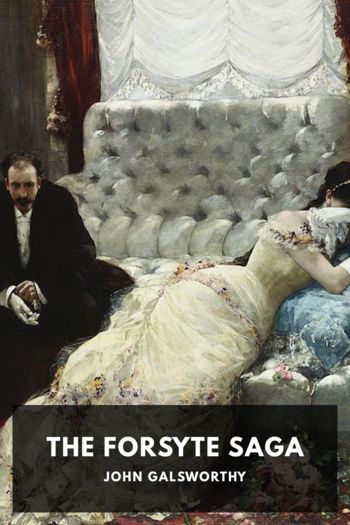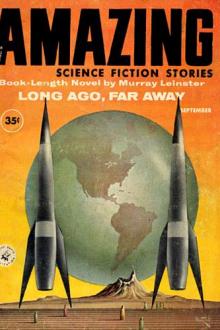The Forsyte Saga - John Galsworthy (best english novels for beginners .txt) 📗

- Author: John Galsworthy
Book online «The Forsyte Saga - John Galsworthy (best english novels for beginners .txt) 📗». Author John Galsworthy
To die out there—lonely—wanting them—wanting home! This seemed to his Forsyte heart more painful, more pitiful than death itself. No shelter, no protection, no love at the last! And all the deeply rooted clanship in him, the family feeling and essential clinging to his own flesh and blood which had been so strong in old Jolyon was so strong in all the Forsytes—felt outraged, cut, and torn by his boy’s lonely passing. Better far if he had died in battle, without time to long for them to come to him, to call out for them, perhaps, in his delirium!
The moon had passed behind the oak-tree now, endowing it with uncanny life, so that it seemed watching him—the oak-tree his boy had been so fond of climbing, out of which he had once fallen and hurt himself, and hadn’t cried!
The door creaked. He saw Irene come in, pick up the telegram and read it. He heard the faint rustle of her dress. She sank on her knees close to him, and he forced himself to smile at her. She stretched up her arms and drew his head down on her shoulder. The perfume and warmth of her encircled him; her presence gained slowly his whole being.
VIII James in WaitingSweated to serenity, Soames dined at the Remove and turned his face toward Park Lane. His father had been unwell lately. This would have to be kept from him! Never till that moment had he realised how much the dread of bringing James’ grey hairs down with sorrow to the grave had counted with him; how intimately it was bound up with his own shrinking from scandal. His affection for his father, always deep, had increased of late years with the knowledge that James looked on him as the real prop of his decline. It seemed pitiful that one who had been so careful all his life and done so much for the family name—so that it was almost a byword for solid, wealthy respectability—should at his last gasp have to see it in all the newspapers. This was like lending a hand to Death, that final enemy of Forsytes. “I must tell mother,” he thought, “and when it comes on, we must keep the papers from him somehow. He sees hardly anyone.” Letting himself in with his latchkey, he was beginning to ascend he stairs when he became conscious of commotion on the second-floor landing. His mother’s voice was saying:
“Now, James, you’ll catch cold. Why can’t you wait quietly?”
His father’s answering:
“Wait? I’m always waiting. Why doesn’t he come in?”
“You can speak to him tomorrow morning, instead of making a guy of yourself on the landing.”
“He’ll go up to bed, I shouldn’t wonder. I shan’t sleep.”
“Now come back to bed, James.”
“Um! I might die before tomorrow morning for all you can tell.”
“You shan’t have to wait till tomorrow morning; I’ll go down and bring him up. Don’t fuss!”
“There you go—always so cock-a-hoop. He mayn’t come in at all.”
“Well, if he doesn’t come in you won’t catch him by standing out here in your dressing-gown.”
Soames rounded the last bend and came in sight of his father’s tall figure wrapped in a brown silk quilted gown, stooping over the balustrade above. Light fell on his silvery hair and whiskers, investing his head with a sort of halo.
“Here he is!” he heard him say in a voice which sounded injured, and his mother’s comfortable answer from the bedroom door:
“That’s all right. Come in, and I’ll brush your hair.” James extended a thin, crooked finger, oddly like the beckoning of a skeleton, and passed through the doorway of his bedroom.
“What is it?” thought Soames. “What has he got hold of now?”
His father was sitting before the dressing-table sideways to the mirror, while Emily slowly passed two silver-backed brushes through and through his hair. She would do this several times a day, for it had on him something of the effect produced on a cat by scratching between its ears.
“There you are!” he said. “I’ve been waiting.”
Soames stroked his shoulder, and, taking up a silver buttonhook, examined the mark on it.
“Well,” he said, “you’re looking better.”
James shook his head.
“I want to say something. Your mother hasn’t heard.” He announced Emily’s ignorance of what he hadn’t told her, as if it were a grievance.
“Your father’s been in a great state all the evening. I’m sure I don’t know what about.”
The faint whisk-whisk of the brushes continued the soothing of her voice.
“No! you know nothing,” said James. “Soames can tell me.” And, fixing his grey eyes, in which there was a look of strain, uncomfortable to watch, on his son, he muttered:
“I’m getting on, Soames. At my age I can’t tell. I might die any time. There’ll be a lot of money. There’s Rachel and Cicely got no children; and Val’s out there—that chap his father will get hold of all he can. And somebody’ll pick up Imogen, I shouldn’t wonder.”
Soames listened vaguely—he had heard all this before. Whish-whish! went the brushes.
“If that’s all!” said Emily.
“All!” cried James; “it’s nothing. I’m coming to that.” And again his eyes strained pitifully at Soames.
“It’s you, my boy,” he said suddenly; “you ought to get a divorce.”
That word, from those of all lips, was almost too much for Soames’ composure. His eyes reconcentrated themselves quickly on the buttonhook, and as if in apology James hurried on:
“I don’t know what’s become of her—they say she’s abroad. Your Uncle Swithin used to admire her—he was a funny fellow.” (So he always alluded to his dead twin—“The Stout and





Comments (0)